Digital Tech Impact on Customer Satisfaction in Tourism: TUI Case
VerifiedAdded on 2020/10/22
|16
|3558
|315
Report
AI Summary
This report critically analyzes the influence of digital technology, including social media platforms and information and communication technology (ICT), on the travel and tourism sector, using TUI Group as a case study. It examines the positive impacts of advanced technology, such as increased operational efficiency and enhanced customer experience, while also addressing the challenges and risks associated with rapid technological changes. The research employs qualitative research methods to explore these impacts, aiming to provide effective recommendations for the sustainable growth and development of the industry. The literature review covers various perspectives on the role of digital technology in improving business operations, customer satisfaction, and communication within the tourism sector, while also acknowledging potential drawbacks like privacy concerns and job displacement. The report concludes by highlighting the need for strategic adaptation to leverage the benefits of digital advancements while mitigating potential risks.
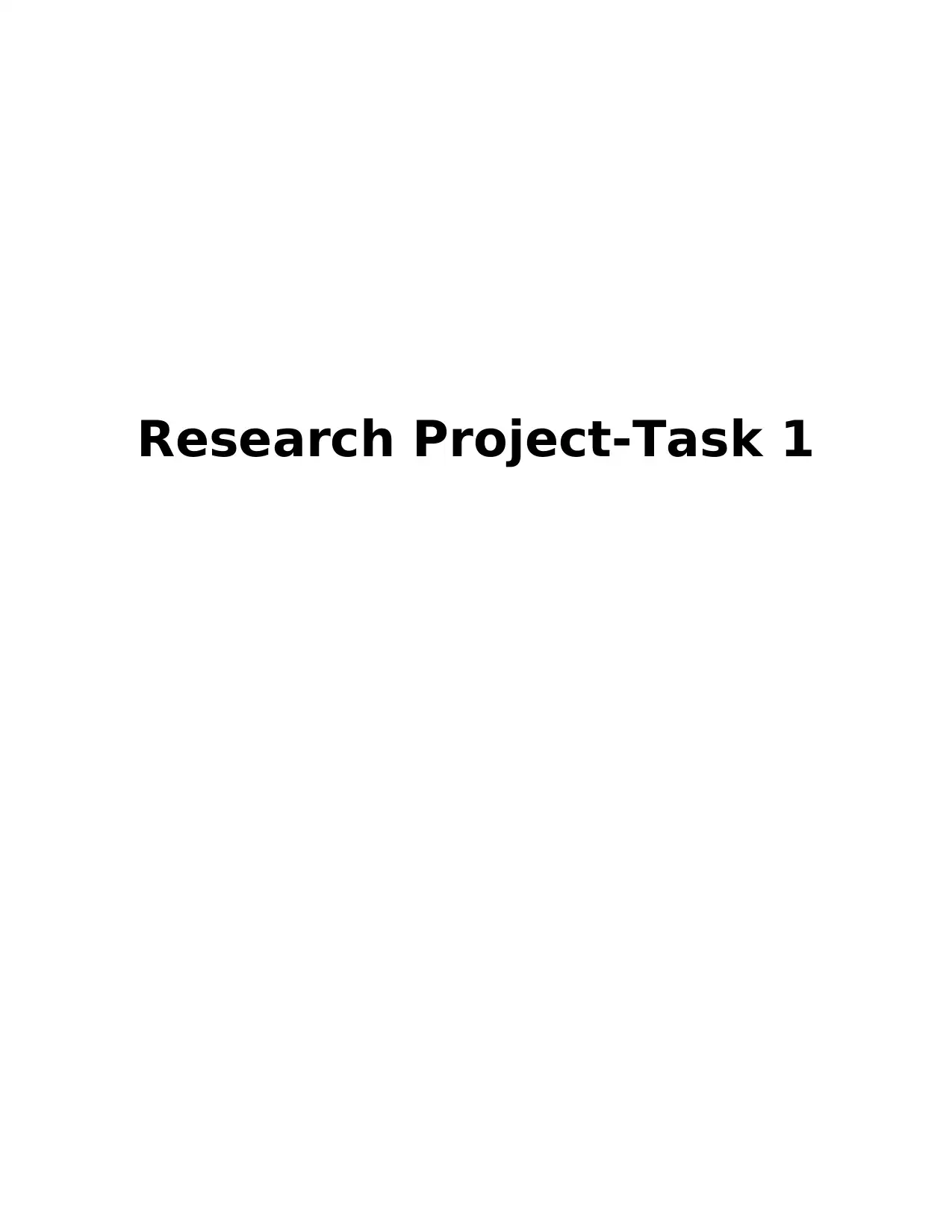
Research Project-Task 1
Paraphrase This Document
Need a fresh take? Get an instant paraphrase of this document with our AI Paraphraser
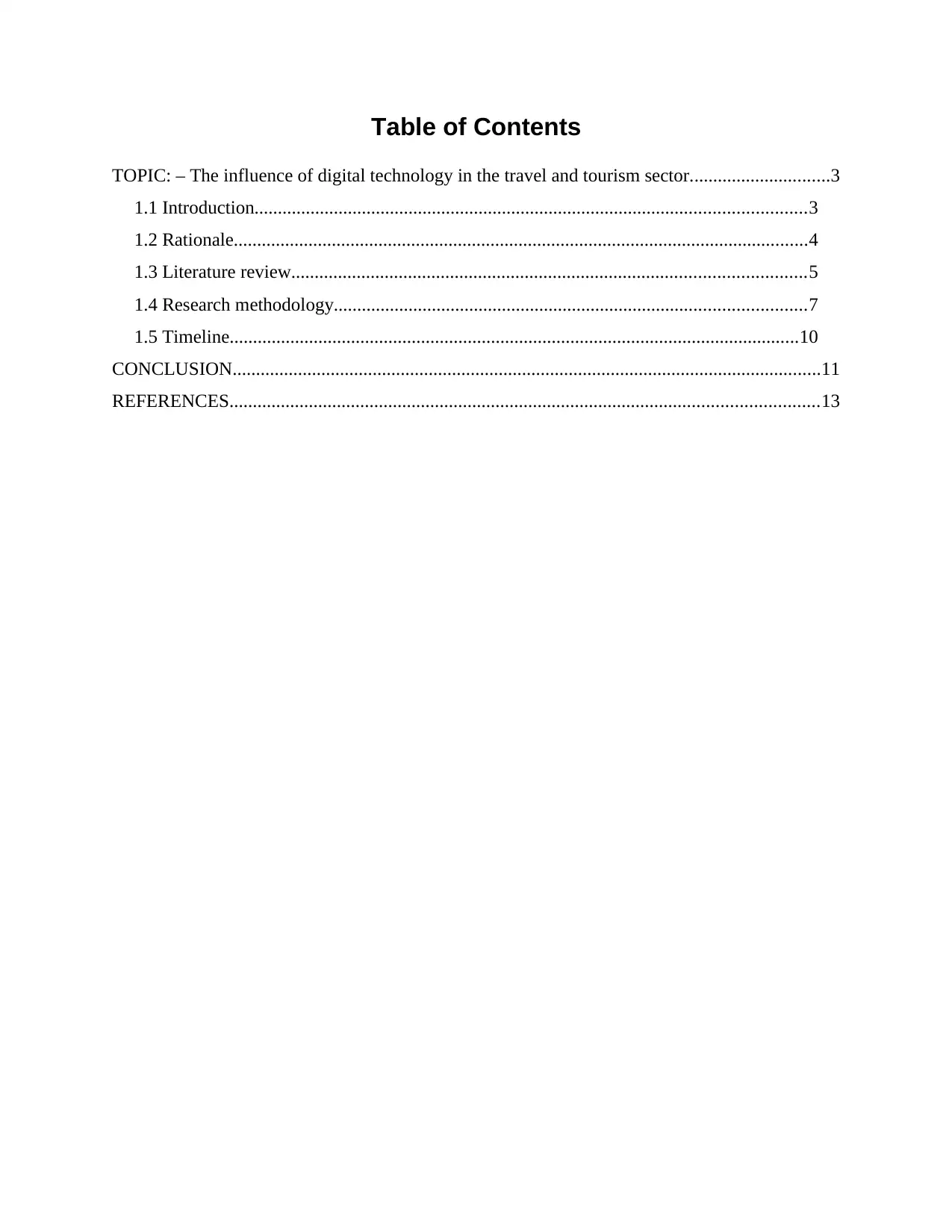
Table of Contents
TOPIC: – The influence of digital technology in the travel and tourism sector..............................3
1.1 Introduction......................................................................................................................3
1.2 Rationale...........................................................................................................................4
1.3 Literature review..............................................................................................................5
1.4 Research methodology.....................................................................................................7
1.5 Timeline..........................................................................................................................10
CONCLUSION..............................................................................................................................11
REFERENCES..............................................................................................................................13
TOPIC: – The influence of digital technology in the travel and tourism sector..............................3
1.1 Introduction......................................................................................................................3
1.2 Rationale...........................................................................................................................4
1.3 Literature review..............................................................................................................5
1.4 Research methodology.....................................................................................................7
1.5 Timeline..........................................................................................................................10
CONCLUSION..............................................................................................................................11
REFERENCES..............................................................................................................................13
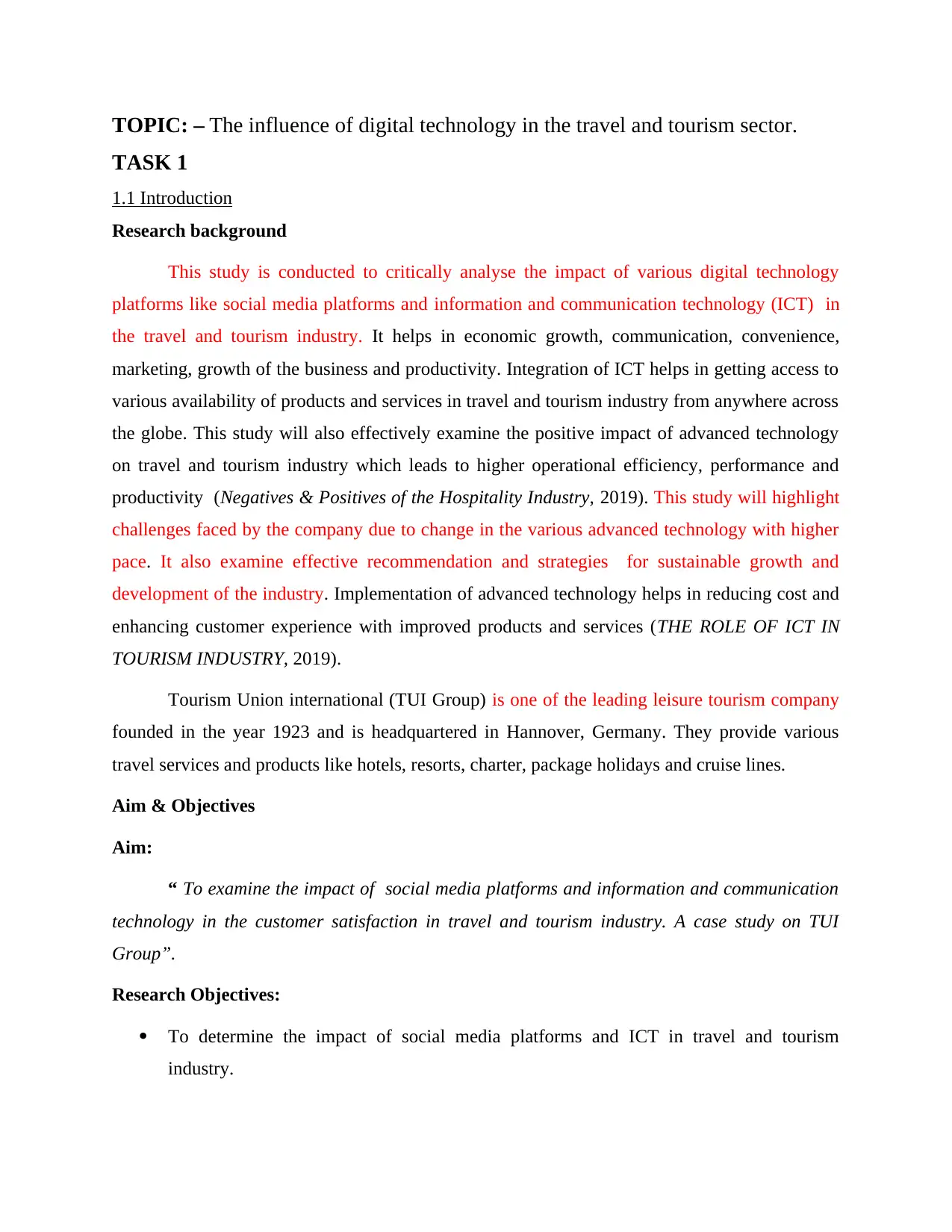
TOPIC: – The influence of digital technology in the travel and tourism sector.
TASK 1
1.1 Introduction
Research background
This study is conducted to critically analyse the impact of various digital technology
platforms like social media platforms and information and communication technology (ICT) in
the travel and tourism industry. It helps in economic growth, communication, convenience,
marketing, growth of the business and productivity. Integration of ICT helps in getting access to
various availability of products and services in travel and tourism industry from anywhere across
the globe. This study will also effectively examine the positive impact of advanced technology
on travel and tourism industry which leads to higher operational efficiency, performance and
productivity (Negatives & Positives of the Hospitality Industry, 2019). This study will highlight
challenges faced by the company due to change in the various advanced technology with higher
pace. It also examine effective recommendation and strategies for sustainable growth and
development of the industry. Implementation of advanced technology helps in reducing cost and
enhancing customer experience with improved products and services (THE ROLE OF ICT IN
TOURISM INDUSTRY, 2019).
Tourism Union international (TUI Group) is one of the leading leisure tourism company
founded in the year 1923 and is headquartered in Hannover, Germany. They provide various
travel services and products like hotels, resorts, charter, package holidays and cruise lines.
Aim & Objectives
Aim:
“ To examine the impact of social media platforms and information and communication
technology in the customer satisfaction in travel and tourism industry. A case study on TUI
Group”.
Research Objectives:
To determine the impact of social media platforms and ICT in travel and tourism
industry.
TASK 1
1.1 Introduction
Research background
This study is conducted to critically analyse the impact of various digital technology
platforms like social media platforms and information and communication technology (ICT) in
the travel and tourism industry. It helps in economic growth, communication, convenience,
marketing, growth of the business and productivity. Integration of ICT helps in getting access to
various availability of products and services in travel and tourism industry from anywhere across
the globe. This study will also effectively examine the positive impact of advanced technology
on travel and tourism industry which leads to higher operational efficiency, performance and
productivity (Negatives & Positives of the Hospitality Industry, 2019). This study will highlight
challenges faced by the company due to change in the various advanced technology with higher
pace. It also examine effective recommendation and strategies for sustainable growth and
development of the industry. Implementation of advanced technology helps in reducing cost and
enhancing customer experience with improved products and services (THE ROLE OF ICT IN
TOURISM INDUSTRY, 2019).
Tourism Union international (TUI Group) is one of the leading leisure tourism company
founded in the year 1923 and is headquartered in Hannover, Germany. They provide various
travel services and products like hotels, resorts, charter, package holidays and cruise lines.
Aim & Objectives
Aim:
“ To examine the impact of social media platforms and information and communication
technology in the customer satisfaction in travel and tourism industry. A case study on TUI
Group”.
Research Objectives:
To determine the impact of social media platforms and ICT in travel and tourism
industry.
⊘ This is a preview!⊘
Do you want full access?
Subscribe today to unlock all pages.

Trusted by 1+ million students worldwide
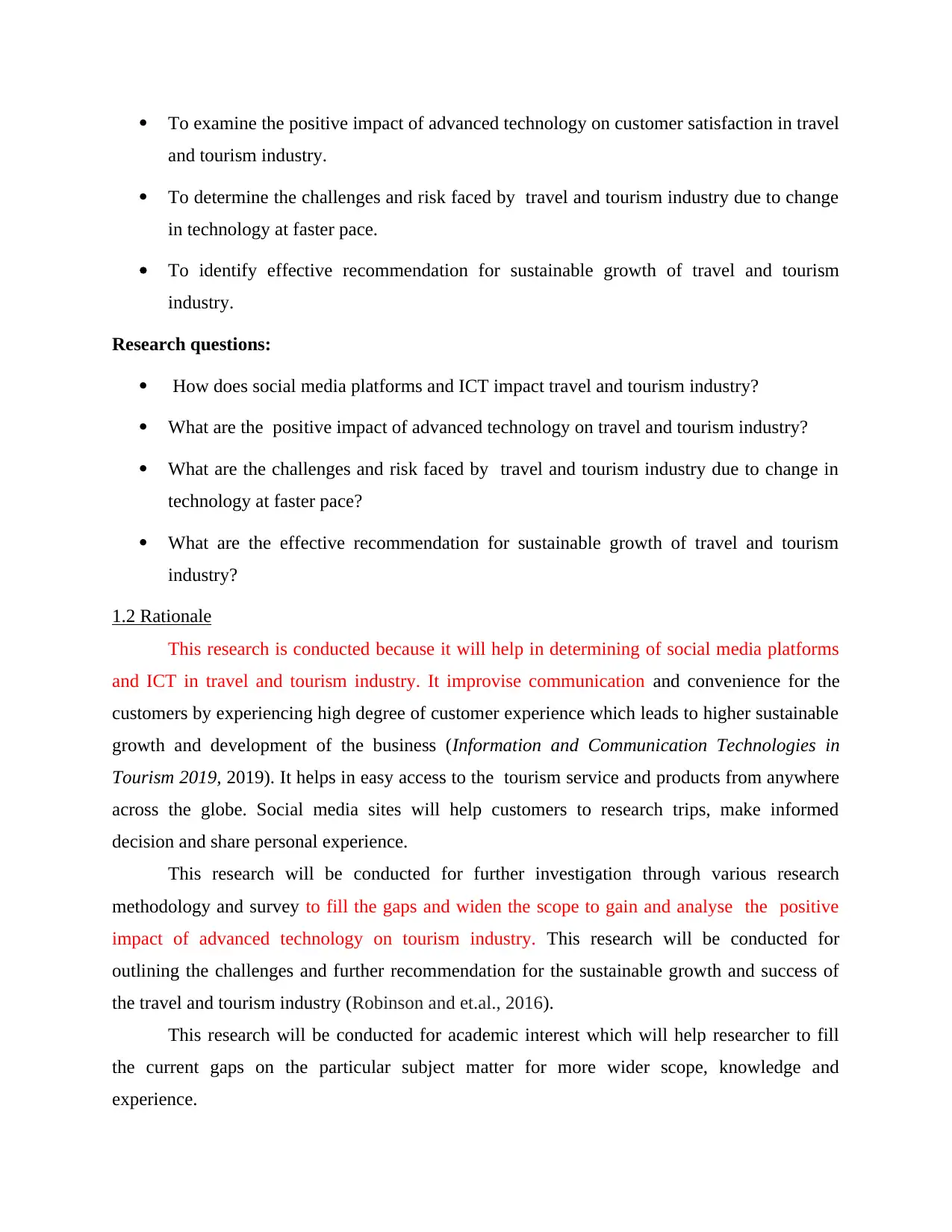
To examine the positive impact of advanced technology on customer satisfaction in travel
and tourism industry.
To determine the challenges and risk faced by travel and tourism industry due to change
in technology at faster pace.
To identify effective recommendation for sustainable growth of travel and tourism
industry.
Research questions:
How does social media platforms and ICT impact travel and tourism industry?
What are the positive impact of advanced technology on travel and tourism industry?
What are the challenges and risk faced by travel and tourism industry due to change in
technology at faster pace?
What are the effective recommendation for sustainable growth of travel and tourism
industry?
1.2 Rationale
This research is conducted because it will help in determining of social media platforms
and ICT in travel and tourism industry. It improvise communication and convenience for the
customers by experiencing high degree of customer experience which leads to higher sustainable
growth and development of the business (Information and Communication Technologies in
Tourism 2019, 2019). It helps in easy access to the tourism service and products from anywhere
across the globe. Social media sites will help customers to research trips, make informed
decision and share personal experience.
This research will be conducted for further investigation through various research
methodology and survey to fill the gaps and widen the scope to gain and analyse the positive
impact of advanced technology on tourism industry. This research will be conducted for
outlining the challenges and further recommendation for the sustainable growth and success of
the travel and tourism industry (Robinson and et.al., 2016).
This research will be conducted for academic interest which will help researcher to fill
the current gaps on the particular subject matter for more wider scope, knowledge and
experience.
and tourism industry.
To determine the challenges and risk faced by travel and tourism industry due to change
in technology at faster pace.
To identify effective recommendation for sustainable growth of travel and tourism
industry.
Research questions:
How does social media platforms and ICT impact travel and tourism industry?
What are the positive impact of advanced technology on travel and tourism industry?
What are the challenges and risk faced by travel and tourism industry due to change in
technology at faster pace?
What are the effective recommendation for sustainable growth of travel and tourism
industry?
1.2 Rationale
This research is conducted because it will help in determining of social media platforms
and ICT in travel and tourism industry. It improvise communication and convenience for the
customers by experiencing high degree of customer experience which leads to higher sustainable
growth and development of the business (Information and Communication Technologies in
Tourism 2019, 2019). It helps in easy access to the tourism service and products from anywhere
across the globe. Social media sites will help customers to research trips, make informed
decision and share personal experience.
This research will be conducted for further investigation through various research
methodology and survey to fill the gaps and widen the scope to gain and analyse the positive
impact of advanced technology on tourism industry. This research will be conducted for
outlining the challenges and further recommendation for the sustainable growth and success of
the travel and tourism industry (Robinson and et.al., 2016).
This research will be conducted for academic interest which will help researcher to fill
the current gaps on the particular subject matter for more wider scope, knowledge and
experience.
Paraphrase This Document
Need a fresh take? Get an instant paraphrase of this document with our AI Paraphraser
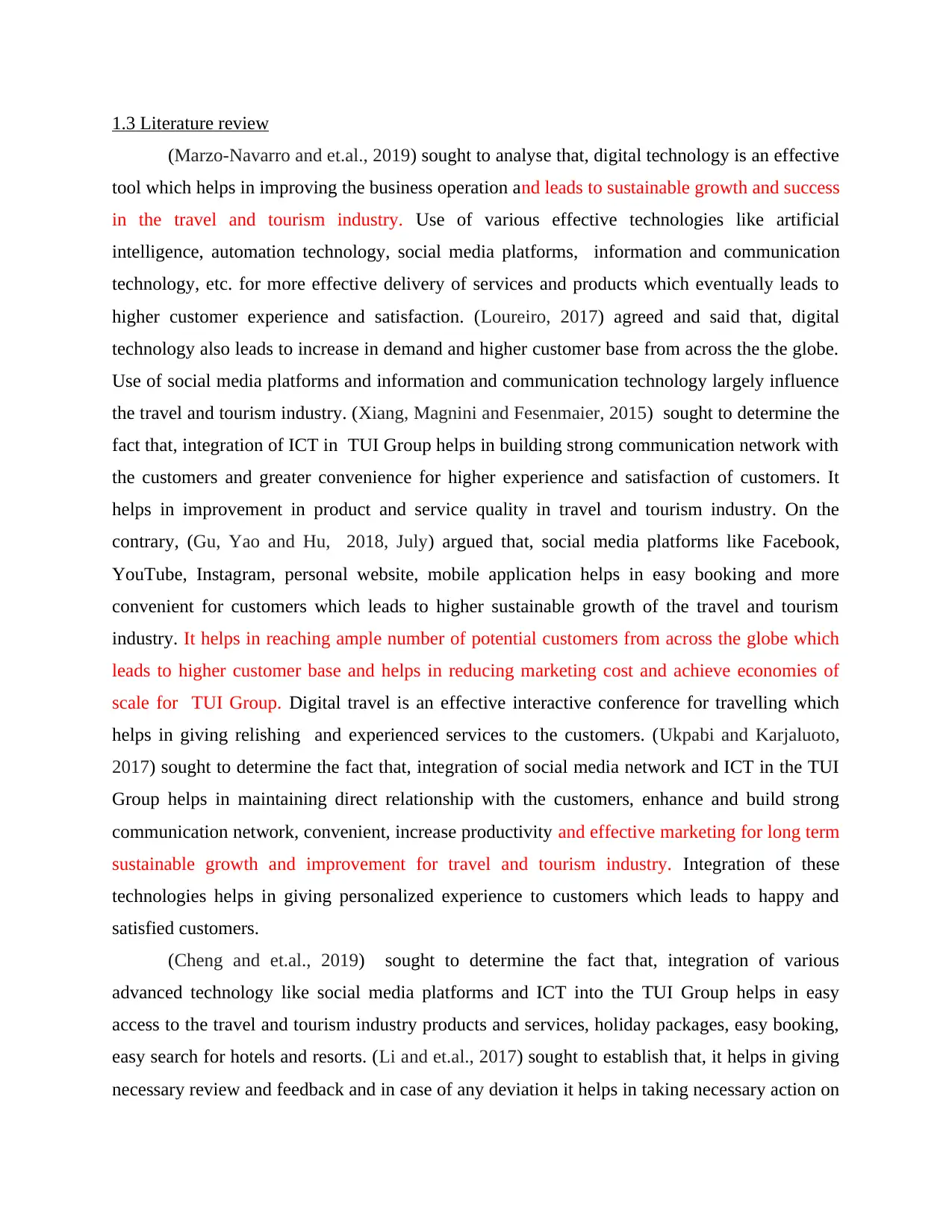
1.3 Literature review
(Marzo-Navarro and et.al., 2019) sought to analyse that, digital technology is an effective
tool which helps in improving the business operation and leads to sustainable growth and success
in the travel and tourism industry. Use of various effective technologies like artificial
intelligence, automation technology, social media platforms, information and communication
technology, etc. for more effective delivery of services and products which eventually leads to
higher customer experience and satisfaction. (Loureiro, 2017) agreed and said that, digital
technology also leads to increase in demand and higher customer base from across the the globe.
Use of social media platforms and information and communication technology largely influence
the travel and tourism industry. (Xiang, Magnini and Fesenmaier, 2015) sought to determine the
fact that, integration of ICT in TUI Group helps in building strong communication network with
the customers and greater convenience for higher experience and satisfaction of customers. It
helps in improvement in product and service quality in travel and tourism industry. On the
contrary, (Gu, Yao and Hu, 2018, July) argued that, social media platforms like Facebook,
YouTube, Instagram, personal website, mobile application helps in easy booking and more
convenient for customers which leads to higher sustainable growth of the travel and tourism
industry. It helps in reaching ample number of potential customers from across the globe which
leads to higher customer base and helps in reducing marketing cost and achieve economies of
scale for TUI Group. Digital travel is an effective interactive conference for travelling which
helps in giving relishing and experienced services to the customers. (Ukpabi and Karjaluoto,
2017) sought to determine the fact that, integration of social media network and ICT in the TUI
Group helps in maintaining direct relationship with the customers, enhance and build strong
communication network, convenient, increase productivity and effective marketing for long term
sustainable growth and improvement for travel and tourism industry. Integration of these
technologies helps in giving personalized experience to customers which leads to happy and
satisfied customers.
(Cheng and et.al., 2019) sought to determine the fact that, integration of various
advanced technology like social media platforms and ICT into the TUI Group helps in easy
access to the travel and tourism industry products and services, holiday packages, easy booking,
easy search for hotels and resorts. (Li and et.al., 2017) sought to establish that, it helps in giving
necessary review and feedback and in case of any deviation it helps in taking necessary action on
(Marzo-Navarro and et.al., 2019) sought to analyse that, digital technology is an effective
tool which helps in improving the business operation and leads to sustainable growth and success
in the travel and tourism industry. Use of various effective technologies like artificial
intelligence, automation technology, social media platforms, information and communication
technology, etc. for more effective delivery of services and products which eventually leads to
higher customer experience and satisfaction. (Loureiro, 2017) agreed and said that, digital
technology also leads to increase in demand and higher customer base from across the the globe.
Use of social media platforms and information and communication technology largely influence
the travel and tourism industry. (Xiang, Magnini and Fesenmaier, 2015) sought to determine the
fact that, integration of ICT in TUI Group helps in building strong communication network with
the customers and greater convenience for higher experience and satisfaction of customers. It
helps in improvement in product and service quality in travel and tourism industry. On the
contrary, (Gu, Yao and Hu, 2018, July) argued that, social media platforms like Facebook,
YouTube, Instagram, personal website, mobile application helps in easy booking and more
convenient for customers which leads to higher sustainable growth of the travel and tourism
industry. It helps in reaching ample number of potential customers from across the globe which
leads to higher customer base and helps in reducing marketing cost and achieve economies of
scale for TUI Group. Digital travel is an effective interactive conference for travelling which
helps in giving relishing and experienced services to the customers. (Ukpabi and Karjaluoto,
2017) sought to determine the fact that, integration of social media network and ICT in the TUI
Group helps in maintaining direct relationship with the customers, enhance and build strong
communication network, convenient, increase productivity and effective marketing for long term
sustainable growth and improvement for travel and tourism industry. Integration of these
technologies helps in giving personalized experience to customers which leads to happy and
satisfied customers.
(Cheng and et.al., 2019) sought to determine the fact that, integration of various
advanced technology like social media platforms and ICT into the TUI Group helps in easy
access to the travel and tourism industry products and services, holiday packages, easy booking,
easy search for hotels and resorts. (Li and et.al., 2017) sought to establish that, it helps in giving
necessary review and feedback and in case of any deviation it helps in taking necessary action on
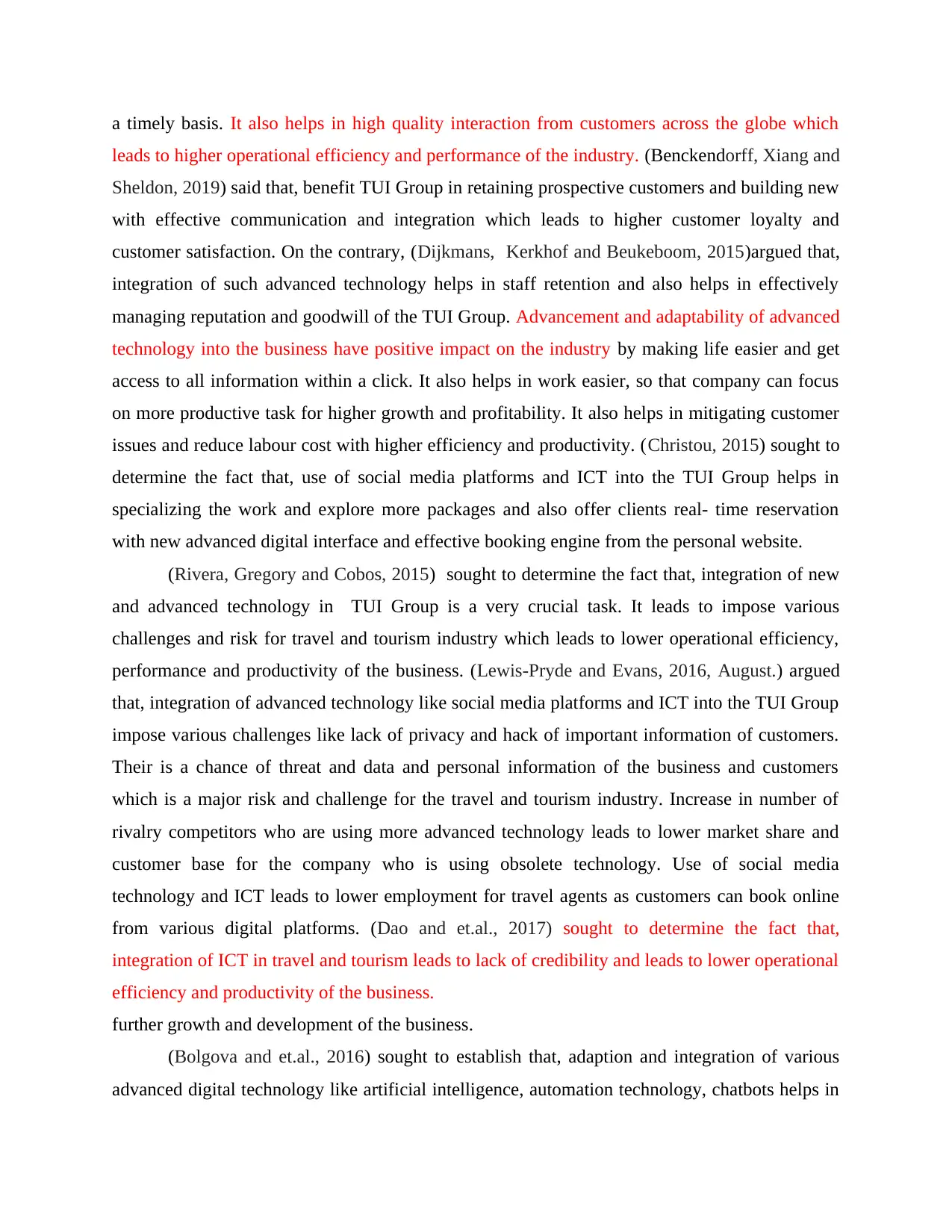
a timely basis. It also helps in high quality interaction from customers across the globe which
leads to higher operational efficiency and performance of the industry. (Benckendorff, Xiang and
Sheldon, 2019) said that, benefit TUI Group in retaining prospective customers and building new
with effective communication and integration which leads to higher customer loyalty and
customer satisfaction. On the contrary, (Dijkmans, Kerkhof and Beukeboom, 2015)argued that,
integration of such advanced technology helps in staff retention and also helps in effectively
managing reputation and goodwill of the TUI Group. Advancement and adaptability of advanced
technology into the business have positive impact on the industry by making life easier and get
access to all information within a click. It also helps in work easier, so that company can focus
on more productive task for higher growth and profitability. It also helps in mitigating customer
issues and reduce labour cost with higher efficiency and productivity. (Christou, 2015) sought to
determine the fact that, use of social media platforms and ICT into the TUI Group helps in
specializing the work and explore more packages and also offer clients real- time reservation
with new advanced digital interface and effective booking engine from the personal website.
(Rivera, Gregory and Cobos, 2015) sought to determine the fact that, integration of new
and advanced technology in TUI Group is a very crucial task. It leads to impose various
challenges and risk for travel and tourism industry which leads to lower operational efficiency,
performance and productivity of the business. (Lewis-Pryde and Evans, 2016, August.) argued
that, integration of advanced technology like social media platforms and ICT into the TUI Group
impose various challenges like lack of privacy and hack of important information of customers.
Their is a chance of threat and data and personal information of the business and customers
which is a major risk and challenge for the travel and tourism industry. Increase in number of
rivalry competitors who are using more advanced technology leads to lower market share and
customer base for the company who is using obsolete technology. Use of social media
technology and ICT leads to lower employment for travel agents as customers can book online
from various digital platforms. (Dao and et.al., 2017) sought to determine the fact that,
integration of ICT in travel and tourism leads to lack of credibility and leads to lower operational
efficiency and productivity of the business.
further growth and development of the business.
(Bolgova and et.al., 2016) sought to establish that, adaption and integration of various
advanced digital technology like artificial intelligence, automation technology, chatbots helps in
leads to higher operational efficiency and performance of the industry. (Benckendorff, Xiang and
Sheldon, 2019) said that, benefit TUI Group in retaining prospective customers and building new
with effective communication and integration which leads to higher customer loyalty and
customer satisfaction. On the contrary, (Dijkmans, Kerkhof and Beukeboom, 2015)argued that,
integration of such advanced technology helps in staff retention and also helps in effectively
managing reputation and goodwill of the TUI Group. Advancement and adaptability of advanced
technology into the business have positive impact on the industry by making life easier and get
access to all information within a click. It also helps in work easier, so that company can focus
on more productive task for higher growth and profitability. It also helps in mitigating customer
issues and reduce labour cost with higher efficiency and productivity. (Christou, 2015) sought to
determine the fact that, use of social media platforms and ICT into the TUI Group helps in
specializing the work and explore more packages and also offer clients real- time reservation
with new advanced digital interface and effective booking engine from the personal website.
(Rivera, Gregory and Cobos, 2015) sought to determine the fact that, integration of new
and advanced technology in TUI Group is a very crucial task. It leads to impose various
challenges and risk for travel and tourism industry which leads to lower operational efficiency,
performance and productivity of the business. (Lewis-Pryde and Evans, 2016, August.) argued
that, integration of advanced technology like social media platforms and ICT into the TUI Group
impose various challenges like lack of privacy and hack of important information of customers.
Their is a chance of threat and data and personal information of the business and customers
which is a major risk and challenge for the travel and tourism industry. Increase in number of
rivalry competitors who are using more advanced technology leads to lower market share and
customer base for the company who is using obsolete technology. Use of social media
technology and ICT leads to lower employment for travel agents as customers can book online
from various digital platforms. (Dao and et.al., 2017) sought to determine the fact that,
integration of ICT in travel and tourism leads to lack of credibility and leads to lower operational
efficiency and productivity of the business.
further growth and development of the business.
(Bolgova and et.al., 2016) sought to establish that, adaption and integration of various
advanced digital technology like artificial intelligence, automation technology, chatbots helps in
⊘ This is a preview!⊘
Do you want full access?
Subscribe today to unlock all pages.

Trusted by 1+ million students worldwide
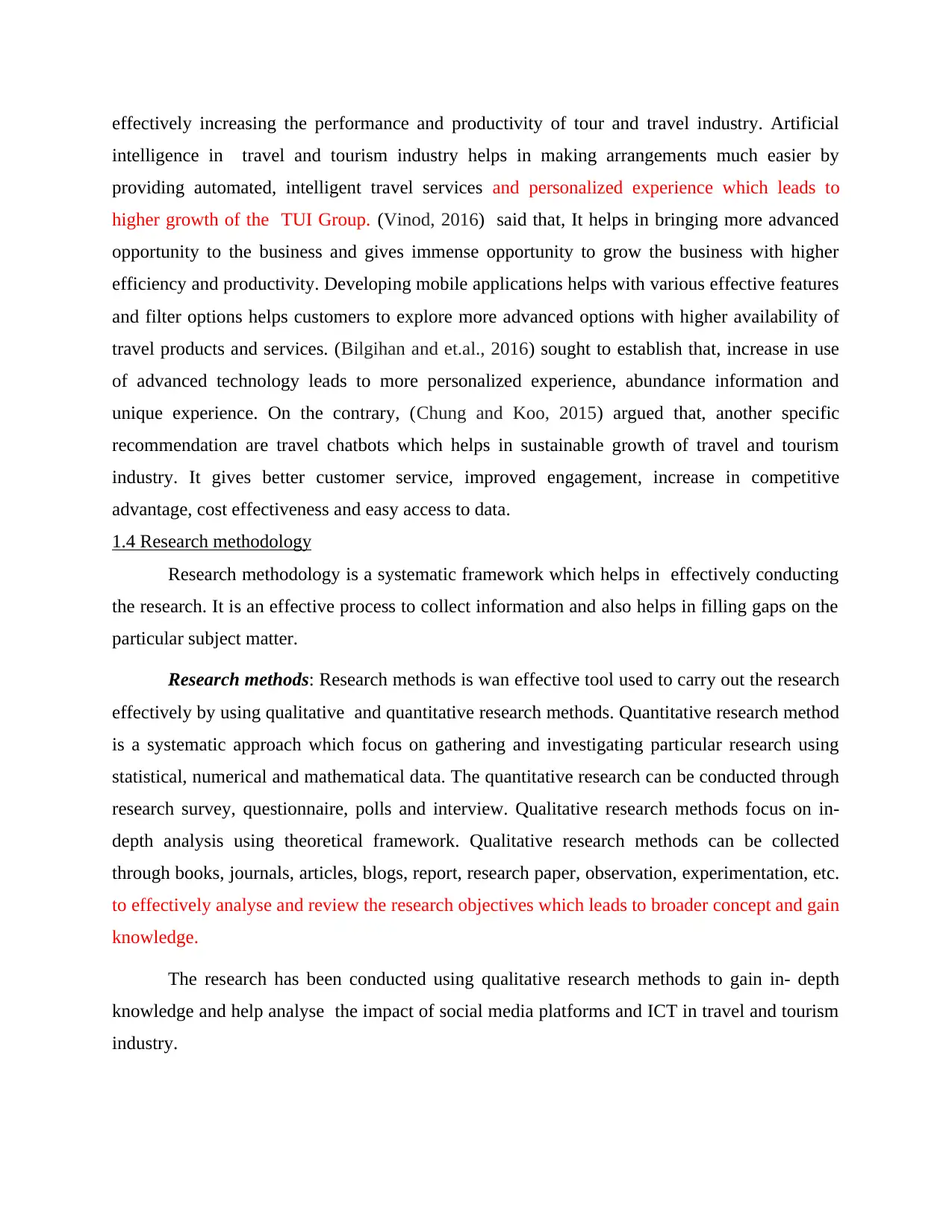
effectively increasing the performance and productivity of tour and travel industry. Artificial
intelligence in travel and tourism industry helps in making arrangements much easier by
providing automated, intelligent travel services and personalized experience which leads to
higher growth of the TUI Group. (Vinod, 2016) said that, It helps in bringing more advanced
opportunity to the business and gives immense opportunity to grow the business with higher
efficiency and productivity. Developing mobile applications helps with various effective features
and filter options helps customers to explore more advanced options with higher availability of
travel products and services. (Bilgihan and et.al., 2016) sought to establish that, increase in use
of advanced technology leads to more personalized experience, abundance information and
unique experience. On the contrary, (Chung and Koo, 2015) argued that, another specific
recommendation are travel chatbots which helps in sustainable growth of travel and tourism
industry. It gives better customer service, improved engagement, increase in competitive
advantage, cost effectiveness and easy access to data.
1.4 Research methodology
Research methodology is a systematic framework which helps in effectively conducting
the research. It is an effective process to collect information and also helps in filling gaps on the
particular subject matter.
Research methods: Research methods is wan effective tool used to carry out the research
effectively by using qualitative and quantitative research methods. Quantitative research method
is a systematic approach which focus on gathering and investigating particular research using
statistical, numerical and mathematical data. The quantitative research can be conducted through
research survey, questionnaire, polls and interview. Qualitative research methods focus on in-
depth analysis using theoretical framework. Qualitative research methods can be collected
through books, journals, articles, blogs, report, research paper, observation, experimentation, etc.
to effectively analyse and review the research objectives which leads to broader concept and gain
knowledge.
The research has been conducted using qualitative research methods to gain in- depth
knowledge and help analyse the impact of social media platforms and ICT in travel and tourism
industry.
intelligence in travel and tourism industry helps in making arrangements much easier by
providing automated, intelligent travel services and personalized experience which leads to
higher growth of the TUI Group. (Vinod, 2016) said that, It helps in bringing more advanced
opportunity to the business and gives immense opportunity to grow the business with higher
efficiency and productivity. Developing mobile applications helps with various effective features
and filter options helps customers to explore more advanced options with higher availability of
travel products and services. (Bilgihan and et.al., 2016) sought to establish that, increase in use
of advanced technology leads to more personalized experience, abundance information and
unique experience. On the contrary, (Chung and Koo, 2015) argued that, another specific
recommendation are travel chatbots which helps in sustainable growth of travel and tourism
industry. It gives better customer service, improved engagement, increase in competitive
advantage, cost effectiveness and easy access to data.
1.4 Research methodology
Research methodology is a systematic framework which helps in effectively conducting
the research. It is an effective process to collect information and also helps in filling gaps on the
particular subject matter.
Research methods: Research methods is wan effective tool used to carry out the research
effectively by using qualitative and quantitative research methods. Quantitative research method
is a systematic approach which focus on gathering and investigating particular research using
statistical, numerical and mathematical data. The quantitative research can be conducted through
research survey, questionnaire, polls and interview. Qualitative research methods focus on in-
depth analysis using theoretical framework. Qualitative research methods can be collected
through books, journals, articles, blogs, report, research paper, observation, experimentation, etc.
to effectively analyse and review the research objectives which leads to broader concept and gain
knowledge.
The research has been conducted using qualitative research methods to gain in- depth
knowledge and help analyse the impact of social media platforms and ICT in travel and tourism
industry.
Paraphrase This Document
Need a fresh take? Get an instant paraphrase of this document with our AI Paraphraser
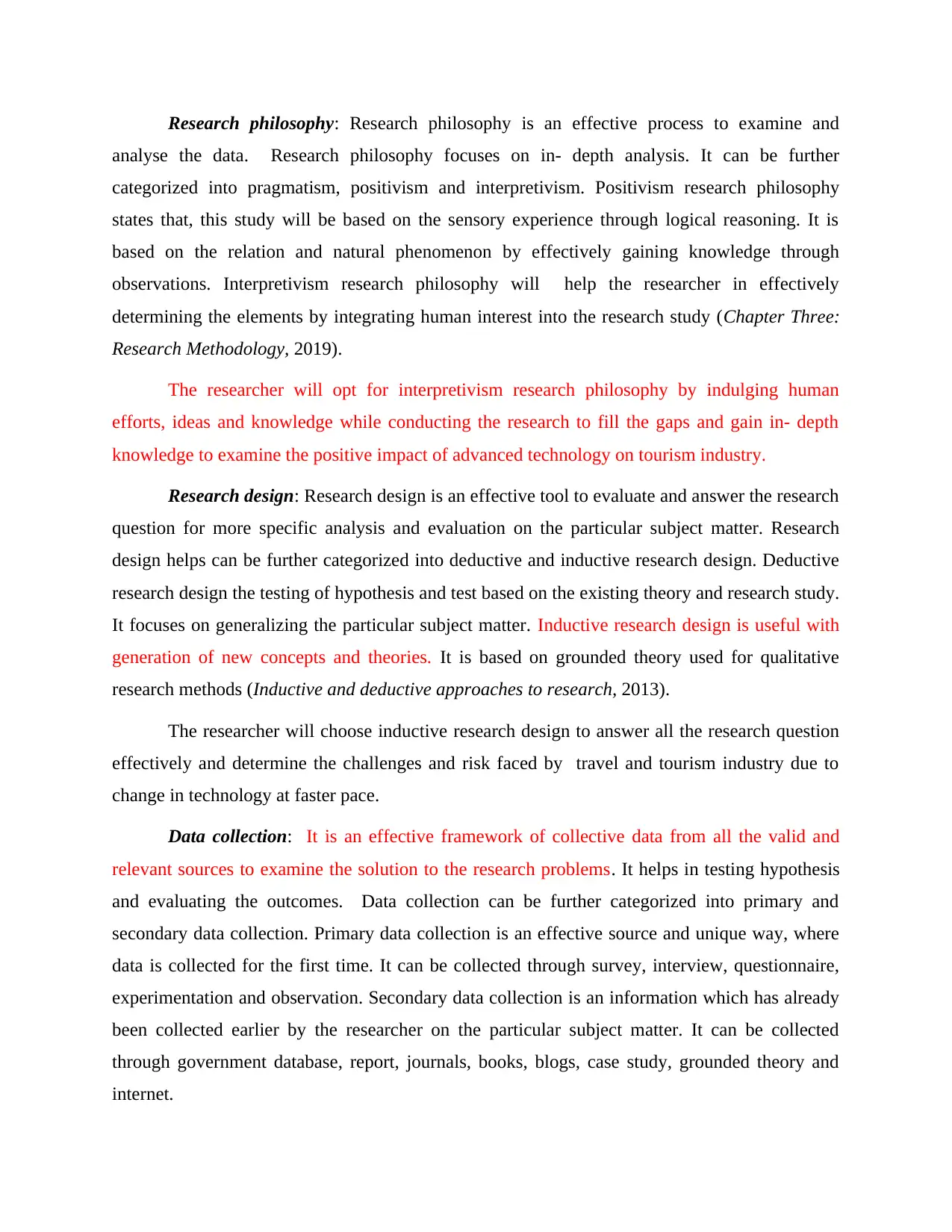
Research philosophy: Research philosophy is an effective process to examine and
analyse the data. Research philosophy focuses on in- depth analysis. It can be further
categorized into pragmatism, positivism and interpretivism. Positivism research philosophy
states that, this study will be based on the sensory experience through logical reasoning. It is
based on the relation and natural phenomenon by effectively gaining knowledge through
observations. Interpretivism research philosophy will help the researcher in effectively
determining the elements by integrating human interest into the research study (Chapter Three:
Research Methodology, 2019).
The researcher will opt for interpretivism research philosophy by indulging human
efforts, ideas and knowledge while conducting the research to fill the gaps and gain in- depth
knowledge to examine the positive impact of advanced technology on tourism industry.
Research design: Research design is an effective tool to evaluate and answer the research
question for more specific analysis and evaluation on the particular subject matter. Research
design helps can be further categorized into deductive and inductive research design. Deductive
research design the testing of hypothesis and test based on the existing theory and research study.
It focuses on generalizing the particular subject matter. Inductive research design is useful with
generation of new concepts and theories. It is based on grounded theory used for qualitative
research methods (Inductive and deductive approaches to research, 2013).
The researcher will choose inductive research design to answer all the research question
effectively and determine the challenges and risk faced by travel and tourism industry due to
change in technology at faster pace.
Data collection: It is an effective framework of collective data from all the valid and
relevant sources to examine the solution to the research problems. It helps in testing hypothesis
and evaluating the outcomes. Data collection can be further categorized into primary and
secondary data collection. Primary data collection is an effective source and unique way, where
data is collected for the first time. It can be collected through survey, interview, questionnaire,
experimentation and observation. Secondary data collection is an information which has already
been collected earlier by the researcher on the particular subject matter. It can be collected
through government database, report, journals, books, blogs, case study, grounded theory and
internet.
analyse the data. Research philosophy focuses on in- depth analysis. It can be further
categorized into pragmatism, positivism and interpretivism. Positivism research philosophy
states that, this study will be based on the sensory experience through logical reasoning. It is
based on the relation and natural phenomenon by effectively gaining knowledge through
observations. Interpretivism research philosophy will help the researcher in effectively
determining the elements by integrating human interest into the research study (Chapter Three:
Research Methodology, 2019).
The researcher will opt for interpretivism research philosophy by indulging human
efforts, ideas and knowledge while conducting the research to fill the gaps and gain in- depth
knowledge to examine the positive impact of advanced technology on tourism industry.
Research design: Research design is an effective tool to evaluate and answer the research
question for more specific analysis and evaluation on the particular subject matter. Research
design helps can be further categorized into deductive and inductive research design. Deductive
research design the testing of hypothesis and test based on the existing theory and research study.
It focuses on generalizing the particular subject matter. Inductive research design is useful with
generation of new concepts and theories. It is based on grounded theory used for qualitative
research methods (Inductive and deductive approaches to research, 2013).
The researcher will choose inductive research design to answer all the research question
effectively and determine the challenges and risk faced by travel and tourism industry due to
change in technology at faster pace.
Data collection: It is an effective framework of collective data from all the valid and
relevant sources to examine the solution to the research problems. It helps in testing hypothesis
and evaluating the outcomes. Data collection can be further categorized into primary and
secondary data collection. Primary data collection is an effective source and unique way, where
data is collected for the first time. It can be collected through survey, interview, questionnaire,
experimentation and observation. Secondary data collection is an information which has already
been collected earlier by the researcher on the particular subject matter. It can be collected
through government database, report, journals, books, blogs, case study, grounded theory and
internet.
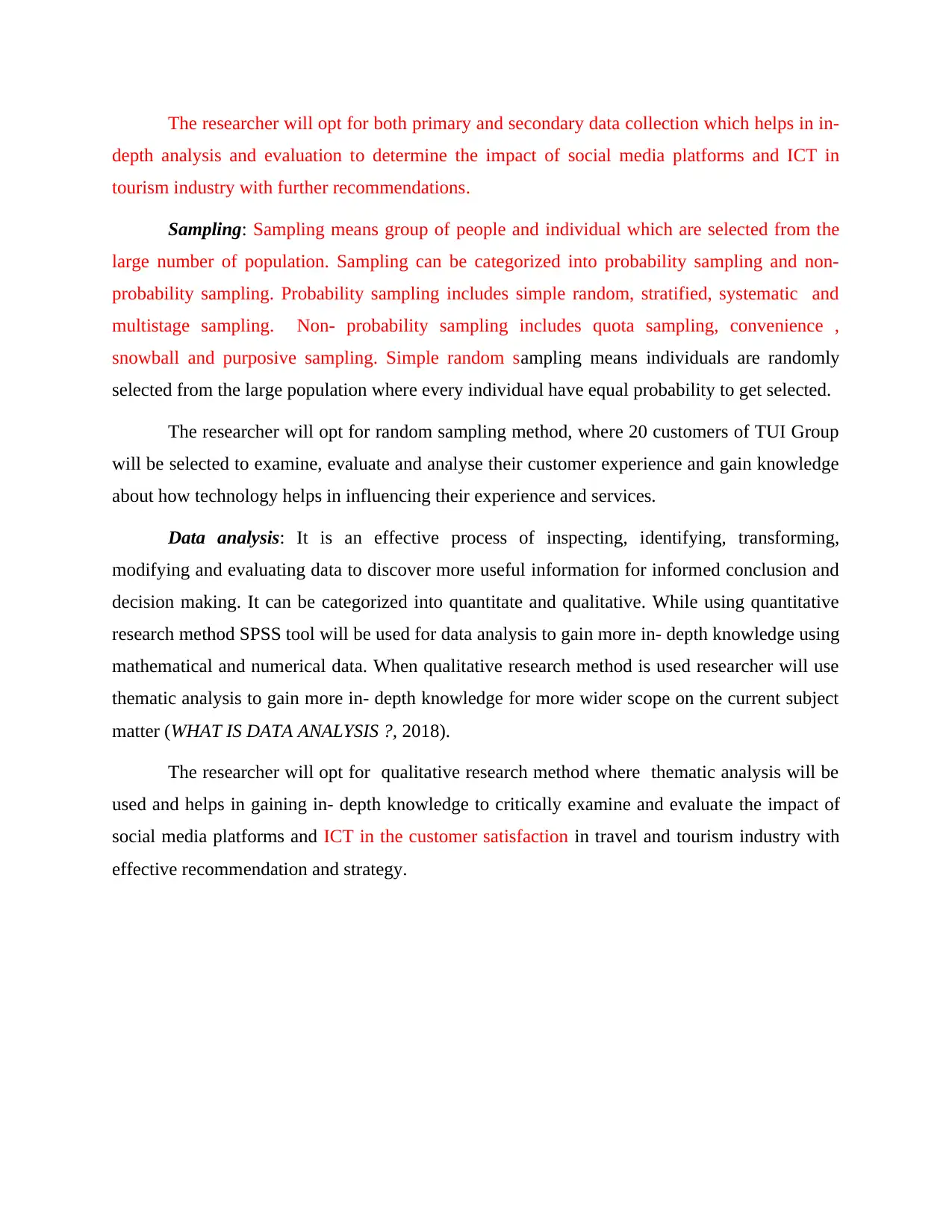
The researcher will opt for both primary and secondary data collection which helps in in-
depth analysis and evaluation to determine the impact of social media platforms and ICT in
tourism industry with further recommendations.
Sampling: Sampling means group of people and individual which are selected from the
large number of population. Sampling can be categorized into probability sampling and non-
probability sampling. Probability sampling includes simple random, stratified, systematic and
multistage sampling. Non- probability sampling includes quota sampling, convenience ,
snowball and purposive sampling. Simple random sampling means individuals are randomly
selected from the large population where every individual have equal probability to get selected.
The researcher will opt for random sampling method, where 20 customers of TUI Group
will be selected to examine, evaluate and analyse their customer experience and gain knowledge
about how technology helps in influencing their experience and services.
Data analysis: It is an effective process of inspecting, identifying, transforming,
modifying and evaluating data to discover more useful information for informed conclusion and
decision making. It can be categorized into quantitate and qualitative. While using quantitative
research method SPSS tool will be used for data analysis to gain more in- depth knowledge using
mathematical and numerical data. When qualitative research method is used researcher will use
thematic analysis to gain more in- depth knowledge for more wider scope on the current subject
matter (WHAT IS DATA ANALYSIS ?, 2018).
The researcher will opt for qualitative research method where thematic analysis will be
used and helps in gaining in- depth knowledge to critically examine and evaluate the impact of
social media platforms and ICT in the customer satisfaction in travel and tourism industry with
effective recommendation and strategy.
depth analysis and evaluation to determine the impact of social media platforms and ICT in
tourism industry with further recommendations.
Sampling: Sampling means group of people and individual which are selected from the
large number of population. Sampling can be categorized into probability sampling and non-
probability sampling. Probability sampling includes simple random, stratified, systematic and
multistage sampling. Non- probability sampling includes quota sampling, convenience ,
snowball and purposive sampling. Simple random sampling means individuals are randomly
selected from the large population where every individual have equal probability to get selected.
The researcher will opt for random sampling method, where 20 customers of TUI Group
will be selected to examine, evaluate and analyse their customer experience and gain knowledge
about how technology helps in influencing their experience and services.
Data analysis: It is an effective process of inspecting, identifying, transforming,
modifying and evaluating data to discover more useful information for informed conclusion and
decision making. It can be categorized into quantitate and qualitative. While using quantitative
research method SPSS tool will be used for data analysis to gain more in- depth knowledge using
mathematical and numerical data. When qualitative research method is used researcher will use
thematic analysis to gain more in- depth knowledge for more wider scope on the current subject
matter (WHAT IS DATA ANALYSIS ?, 2018).
The researcher will opt for qualitative research method where thematic analysis will be
used and helps in gaining in- depth knowledge to critically examine and evaluate the impact of
social media platforms and ICT in the customer satisfaction in travel and tourism industry with
effective recommendation and strategy.
⊘ This is a preview!⊘
Do you want full access?
Subscribe today to unlock all pages.

Trusted by 1+ million students worldwide
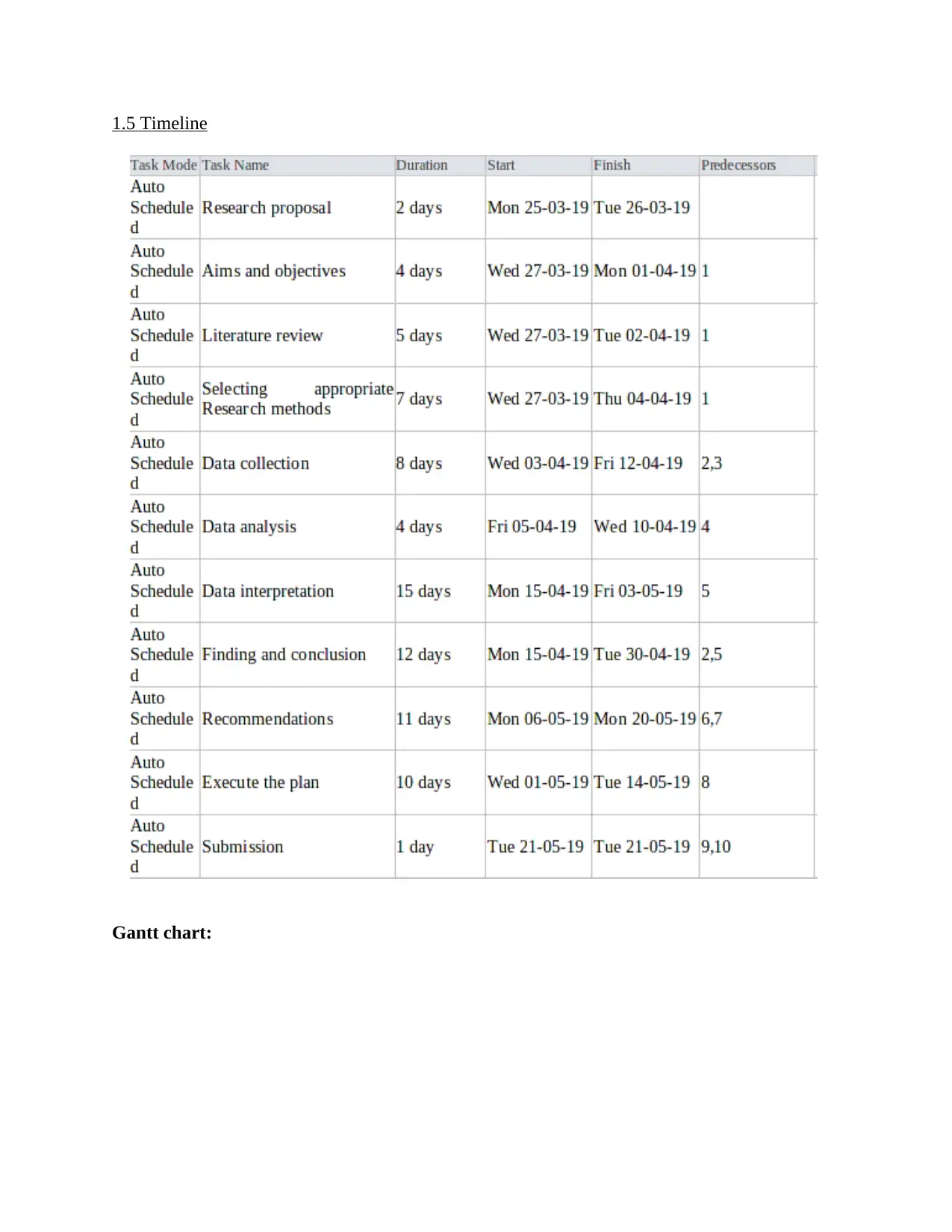
1.5 Timeline
Gantt chart:
Gantt chart:
Paraphrase This Document
Need a fresh take? Get an instant paraphrase of this document with our AI Paraphraser
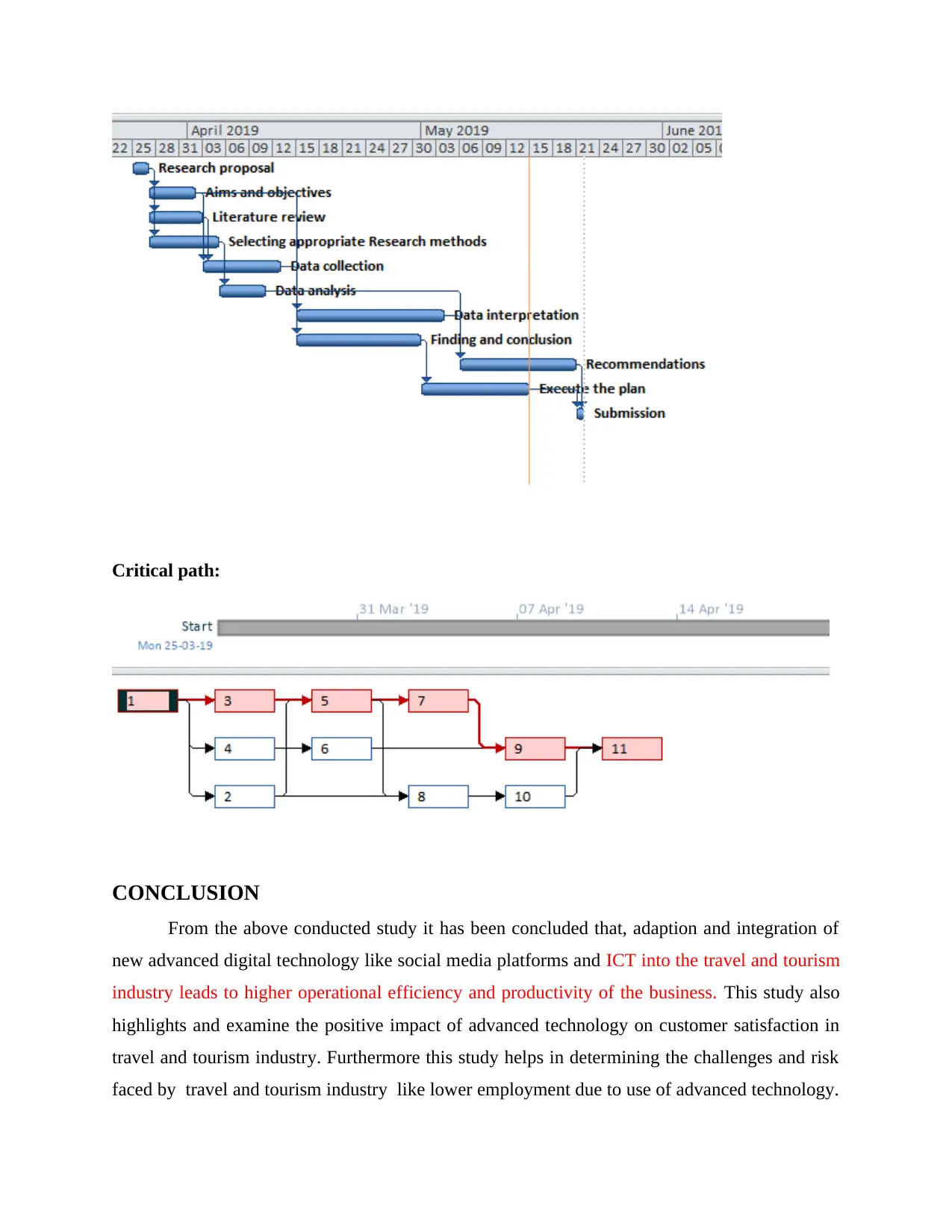
Critical path:
CONCLUSION
From the above conducted study it has been concluded that, adaption and integration of
new advanced digital technology like social media platforms and ICT into the travel and tourism
industry leads to higher operational efficiency and productivity of the business. This study also
highlights and examine the positive impact of advanced technology on customer satisfaction in
travel and tourism industry. Furthermore this study helps in determining the challenges and risk
faced by travel and tourism industry like lower employment due to use of advanced technology.
CONCLUSION
From the above conducted study it has been concluded that, adaption and integration of
new advanced digital technology like social media platforms and ICT into the travel and tourism
industry leads to higher operational efficiency and productivity of the business. This study also
highlights and examine the positive impact of advanced technology on customer satisfaction in
travel and tourism industry. Furthermore this study helps in determining the challenges and risk
faced by travel and tourism industry like lower employment due to use of advanced technology.
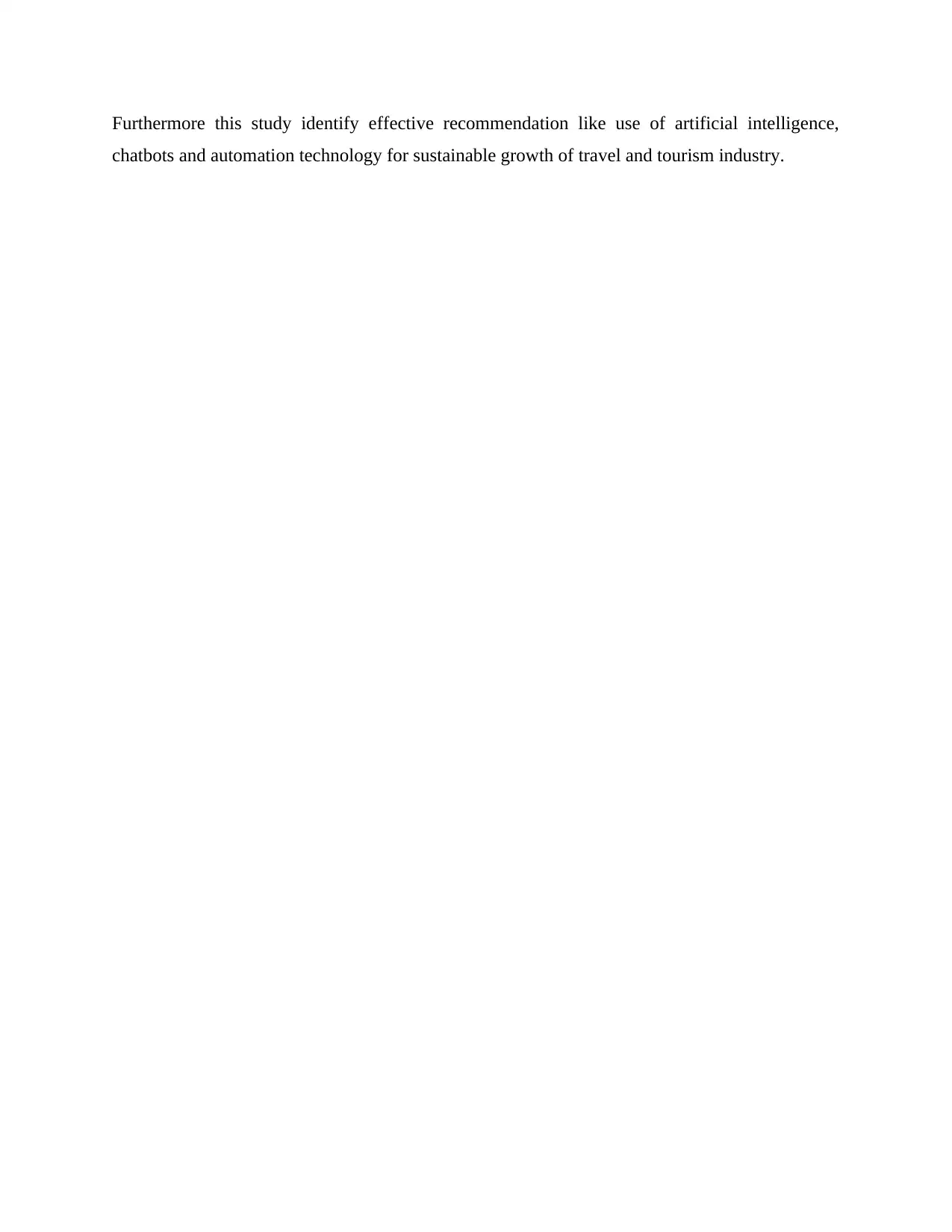
Furthermore this study identify effective recommendation like use of artificial intelligence,
chatbots and automation technology for sustainable growth of travel and tourism industry.
chatbots and automation technology for sustainable growth of travel and tourism industry.
⊘ This is a preview!⊘
Do you want full access?
Subscribe today to unlock all pages.

Trusted by 1+ million students worldwide
1 out of 16
Related Documents
Your All-in-One AI-Powered Toolkit for Academic Success.
+13062052269
info@desklib.com
Available 24*7 on WhatsApp / Email
![[object Object]](/_next/static/media/star-bottom.7253800d.svg)
Unlock your academic potential
Copyright © 2020–2026 A2Z Services. All Rights Reserved. Developed and managed by ZUCOL.




